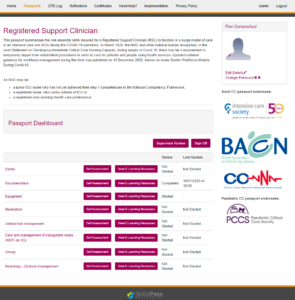Critical Care Passports for Intensive Care Workers
Axia’s skills passports were first developed at the request of The Imperial College Health Care Trust during the second wave of the COVID-19 pandemic. Our development team worked with NHS staff to produce the Critical Care Passport.
Optimising Skills Checking for More Effective Work
The Passport enabled medical staff to move between different Intensive Care Units more easily, creating a mobile workforce. It contained all of the required capabilities for staff and information about equipment in an easily accessible format. This removed the need for lengthy skills checking when staff members arrive at a new ward. The passport also allows line managers to familiarise themselves with the skills and knowledge of incoming staff before shifts started. This enables them to plan how to utilise team members effectively.
Jane Fish, the project manager, commented on the importance of the PAN London Critical Care Passport:
“This work led by Clare Leon Villapalos, (Imperial College Health Care Trust) in partnership with stakeholders across London, on the CC Skills Passport for RSC and NRSS roles will make an important contribution to preparing and supporting staff redeployed during surge to ICU and COVID clinical areas. Providing the Skills Passport on a digital platform will enhance its accessibility for both Registered Support Clinician (RSC) and Non Registered Support Staff (NRSS) users as well as for the staff working in the environments where staff members have been redeployed.”
Below is a video of Clare Leon briefly explaining the purpose of the passport:
How The Critical Care Passports Work
 Supporting Staff
Supporting Staff
We designed the Critical Care (CC) digital skills passports to aid staff in comprehending, documenting, and accessing the required education/training for role essential skills essential for functioning in a high dependency unit (HDU) / intensive care unit (ICU) surge model. These passports do not replace the natural development of staff skills / knowledge under normal circumstances, but are designed to aid in surge situations.
These user-friendly passports are available for staff caring for adults or children who require critical care. They are mobile-friendly and users can access them via computer, smartphone, or tablet. There are two passports available for staff working with adult CC patients and four for staff working with paediatric CC patients. A user guide provides step-by-step instructions on how to access and use the passports, for those who need it.
Registration and Assessment
Once a staff member has registered for an account, they can selected the passports relevant to them and self-assess their ability to demonstrate knowledge and safely undertake a range of skills. At the top of the “Passports” tab within the website, staff members can find full descriptions of who each passport is relevant for.
A supervisor is required to sign off on their proficiencies for each knowledge or skill. A final supervisor sign-off is then required for a staff member to download their certificate, which recognises their ability to safely perform that role. Hyperlinks to relevant e-learning resources are provided within the passports for self-directed learning. The passport website also enables staff to log their CPD training and add their workplace reflections.
Administration and Reporting
Administrators for the website receive access at a level appropriate to their seniority. A global admin is able to pull data across the whole passport, or limit their reporting to a particular region or Trust.
Admins can view which and how many of their staff have accessed the passport. They can assess the skills within their teams by viewing individual member data and also explore and export their Trust’s data. The admin reporting functionalities of the website include providing a visual summary of staff completion numbers for passports, a detailed data export in the form of an Excel spreadsheet, and a Skill Completion Heatmap.
When a framework like the Critical Care Passport gains national recognition, managers can access information that offers insight into the current skills and capabilities of the workforce. This vital information allows leaders to manage shortages and predict skill gaps that may develop in the future.
Country-wide Success
After successfully launching the passport in London, we further introduced the Critical Skills Passport across England. The widespread adoption of the passport has streamlined skill assessment and mobility for medical staff throughout the country.
This streamlined approach has not only saved valuable time but also enhanced the efficiency of medical operations, allowing healthcare professionals to focus more on delivering quality care to patients.
Managing Director Richard Etheridge reflected on recent discussions;
“Over the last 20 years Axia Digital has been enabling professionals to demonstrate their capability to manage personal and professional development within the workplace. This has traditionally been driven by us working with professional bodies. However, as the world has changed because of COVID we have found that organisations are approaching us to build tools such as passports. We have been having some interesting discussions about how the passports can benefit these organisations in their future planning of the workforce; forecasting where shortages may appear, in succession planning as people leave the business and where new skills may be required in the future, thus enabling the development of relevant learning and targeting that learning on the future workforce.”